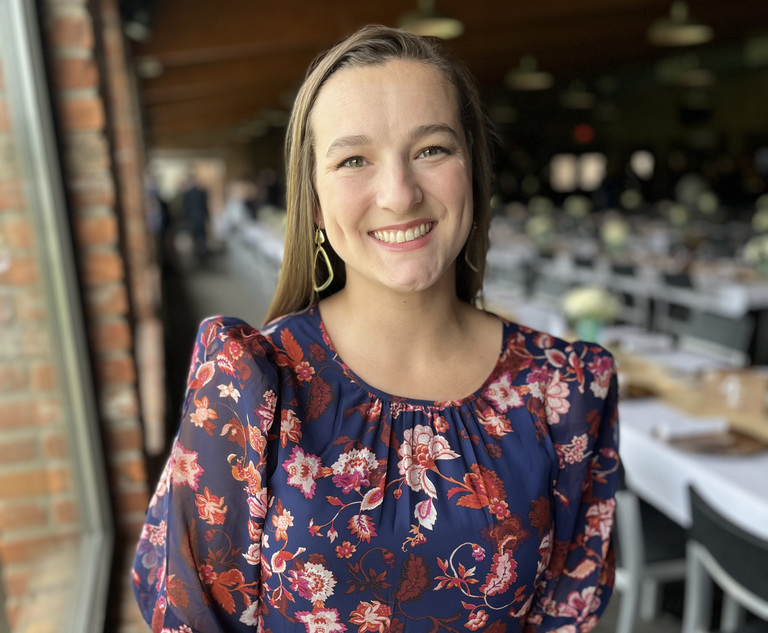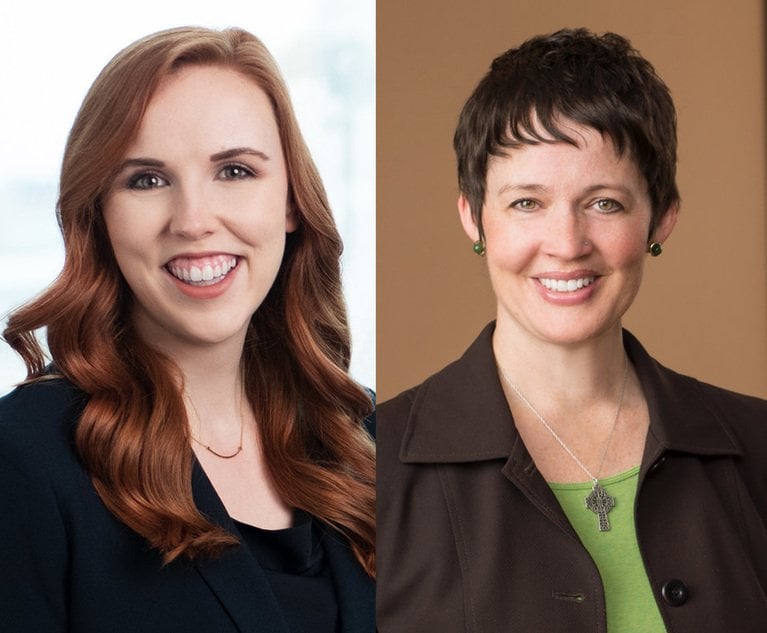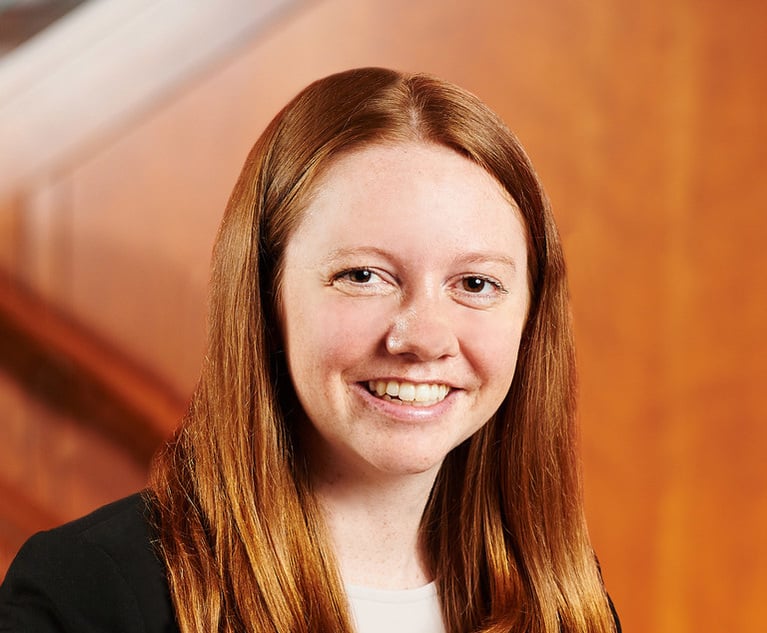 Lindsay Burrill-VanDellen of Berney & Sang. Courtesy photo
Lindsay Burrill-VanDellen of Berney & Sang. Courtesy photoState-Sanctioned Discrimination: Title IX’s Expansive Loophole for Religious Institutions
Title IX has an exception that allows widespread state-sanctioned discrimination against LGBTQ+ students in universities across the nation: the religious exemption. While Congress intended this exemption to be narrow—not “a giant loophole leading to widespread sex discrimination in education”—it has been anything but narrow, and as a result, Congress’ fears about widespread discrimination are being realized.
December 16, 2024 at 11:59 AM
8 minute read
Anne grew up in the Bible Belt. She was raised in an evangelical Christian home and community where there were few minorities, little religious diversity, and homophobia was expected, even encouraged. She never knew anyone growing up who identified as LGBTQ+ and her family, friends and church made clear that being gay was simply not an option. When Anne was looking at colleges to attend after high school, it was expected that she would go to a Christian university. So she did.
To attend that evangelical Christian university, the school required Anne to sign a code of conduct that prohibited, among other things, “homosexual activity,” “same-sex dating behaviors,” and gender nonconforming behavior. Of course, at that time, Anne didn’t give these rules a second thought ... being gay was not an option, after all. But, as is the case for many young college students, Anne soon came to terms with her sexuality, realized she was gay, and began dating a woman. But Anne hid this part of her life throughout her college years, fearing harassment by peers and professors, the possibility of losing her on-campus housing or job, and even the risk of being expelled before she could complete her degree. Anne was forced to live a double life, alienating herself from her friends, peers, and professors, which quickly deteriorated her relationships and her mental and emotional wellbeing.
NOT FOR REPRINT
© 2025 ALM Global, LLC, All Rights Reserved. Request academic re-use from www.copyright.com. All other uses, submit a request to [email protected]. For more information visit Asset & Logo Licensing.
You Might Like
View All
From 'Confusing Labyrinth' to Speeding 'Roller Coaster': Uncertainty Reigns in Title IX as Litigators Await Second Trump Admin
6 minute read
'What Is Certain Is Uncertainty': Patchwork Title IX Rules Face Expected Changes in Second Trump Administration
5 minute read
Trending Stories
- 1Courts Grapple With The Corporate Transparency Act
- 2FTC Chair Lina Khan Sues John Deere Over 'Right to Repair,' Infuriates Successor
- 3‘Facebook’s Descent Into Toxic Masculinity’ Prompts Stanford Professor to Drop Meta as Client
- 4Pa. Superior Court: Sorority's Interview Notes Not Shielded From Discovery in Lawsuit Over Student's Death
- 5Kraken’s Chief Legal Officer Exits, Eyes Role in Trump Administration
Who Got The Work
J. Brugh Lower of Gibbons has entered an appearance for industrial equipment supplier Devco Corporation in a pending trademark infringement lawsuit. The suit, accusing the defendant of selling knock-off Graco products, was filed Dec. 18 in New Jersey District Court by Rivkin Radler on behalf of Graco Inc. and Graco Minnesota. The case, assigned to U.S. District Judge Zahid N. Quraishi, is 3:24-cv-11294, Graco Inc. et al v. Devco Corporation.
Who Got The Work
Rebecca Maller-Stein and Kent A. Yalowitz of Arnold & Porter Kaye Scholer have entered their appearances for Hanaco Venture Capital and its executives, Lior Prosor and David Frankel, in a pending securities lawsuit. The action, filed on Dec. 24 in New York Southern District Court by Zell, Aron & Co. on behalf of Goldeneye Advisors, accuses the defendants of negligently and fraudulently managing the plaintiff's $1 million investment. The case, assigned to U.S. District Judge Vernon S. Broderick, is 1:24-cv-09918, Goldeneye Advisors, LLC v. Hanaco Venture Capital, Ltd. et al.
Who Got The Work
Attorneys from A&O Shearman has stepped in as defense counsel for Toronto-Dominion Bank and other defendants in a pending securities class action. The suit, filed Dec. 11 in New York Southern District Court by Bleichmar Fonti & Auld, accuses the defendants of concealing the bank's 'pervasive' deficiencies in regards to its compliance with the Bank Secrecy Act and the quality of its anti-money laundering controls. The case, assigned to U.S. District Judge Arun Subramanian, is 1:24-cv-09445, Gonzalez v. The Toronto-Dominion Bank et al.
Who Got The Work
Crown Castle International, a Pennsylvania company providing shared communications infrastructure, has turned to Luke D. Wolf of Gordon Rees Scully Mansukhani to fend off a pending breach-of-contract lawsuit. The court action, filed Nov. 25 in Michigan Eastern District Court by Hooper Hathaway PC on behalf of The Town Residences LLC, accuses Crown Castle of failing to transfer approximately $30,000 in utility payments from T-Mobile in breach of a roof-top lease and assignment agreement. The case, assigned to U.S. District Judge Susan K. Declercq, is 2:24-cv-13131, The Town Residences LLC v. T-Mobile US, Inc. et al.
Who Got The Work
Wilfred P. Coronato and Daniel M. Schwartz of McCarter & English have stepped in as defense counsel to Electrolux Home Products Inc. in a pending product liability lawsuit. The court action, filed Nov. 26 in New York Eastern District Court by Poulos Lopiccolo PC and Nagel Rice LLP on behalf of David Stern, alleges that the defendant's refrigerators’ drawers and shelving repeatedly break and fall apart within months after purchase. The case, assigned to U.S. District Judge Joan M. Azrack, is 2:24-cv-08204, Stern v. Electrolux Home Products, Inc.
Featured Firms
Law Offices of Gary Martin Hays & Associates, P.C.
(470) 294-1674
Law Offices of Mark E. Salomone
(857) 444-6468
Smith & Hassler
(713) 739-1250






